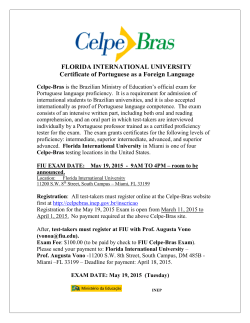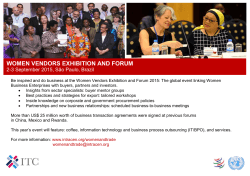
PORTUGUESE AND BRAZILIAN STUDIES
PORTUGUESE AND BRAZILIAN STUDIES Interdisciplinary bachelor and master education THE DANISH GOVERNMENT HAS STRENGTHENED ITS FOCUS ON BRAZIL WHAT DOES PORTUGUESE AND BRAZILIAN STUDIES OFFER? Octávio Frias de Oliveira Bridge, São Paulo In light of Brazil’s status as an economic global player, the Danish government has implemented new initiatives to strengthen Danish-Brazilian cooperation in research, technology and industry. At the same time, the Export Council of the Ministry of Foreign Affairs has increased its focus on Brazil as a viable growth market for Danish business through the opening of an innovation center in São Paulo. Since 2012, Denmark has participated in Brazil’s Science without Borders program to strengthen bilateral research projects and exchange agreements between the higher education institutions of the two countries. In 2012 the Danish Ministry of Education decided, for the first time, to allow the instruction of Portuguese as a high school subject. WHAT CAREER OUTCOMES ARE POSSIBLE? With an education in Portuguese and Brazilian studies you acquire excellent skills in Portuguese and a basic insight into the cultural diversity of the Portuguese speaking world, which includes countries in Europe such as Portugal, Brazil in South America, Angola, Mozambique, Cape Verde, Guinea-Bissau and São Tomé and Principe in Africa, and East Timor and the Chinese peninsula of Macau in Asia. The analytical and communicative competences, along with the knowledge and skills you obtain through your choice of electives, will provide you as a graduate of this program, with a broad range of career opportunities in both the public and private sectors as a graduate of this program. Below are just some career possibilities you can consider. Further information (in Danish): studier.ku.dk/bachelor/ portugisiske-brasilianske-studier Language and communication consultancy • culture training consultancy • international relations Tourism • teaching • translation and interpretation • international development and relief work • foreign service • export industry • research • journalism • market analysis The Atrium, the Faculty of Humanities The University of Copenhagen takes an interdisciplinary, area studies approach to Portuguese and Brazilian studies, markedly so in the new (2013) curriculum. New theoretical and pedagogical approaches will provide you with the skills necessary to handle a wide range of tasks in the workplace. New approaches New topics New ways of working We draw on concepts, theories and methods from both the humanities and the social sciences. You will gain broad experience in carrying out research projects involving historical, political, socioeconomic, literary and linguistic analysis, often taking a crossdisciplinary approach. In the program we will develop your awareness of ways in which language shapes “reality” and plays a crucial role in identity construction. Globalization, migration, social marginalization and ethnicity are just a few of the topics we cover in relation to the Portuguese-speaking world. We examine these topics from both a theoretical-analytical perspective, as well as from political and business points of view. The individual courses of the program are designed to be flexible, so new knowledge and perspectives can easily be integrated in the teaching. Team projects addressing real-world problems are an integral part of several of the courses in our program. Problem-based learning enhances your ability to solve problems that may arise in the real world. During the entire education, you will gain skills in the collaborative solving of specific problems. One such project is to plan and carry out a project with a business enterprise or organization in Denmark, Portugal or Brazil. XXXXXX B.A. Program THE STRUCTURE OF THE B.A. PROGRAM Fall Semester In the first year, you will develop linguistic competence in Portuguese and be introduced to concepts, theories and methods that will enable you to analyze problems and issues in the Portuguese-speaking world, from a cross-disciplinary perspective. In Year 2, you will learn to use your analytical tools to apply the acquired conceptual knowledge and language skills to problems and issues pertinent to your interest. For example, you will study such areas as: 1st year 2nd year Spring Semester Elementary Portuguese 1 Elementary Portuguese 2 Introduction to Area Studies Debates and Voices in Brazilian Society Introduction to the Portuguese-speaking world The Portuguese Language in Time and Space Discourse and Identity Brazil as a Global Player Debates and Voices in Portuguese Society Theory of Knowledge Film, Media and the Arts in Portuguese in a Globalized World Problem-based Team Project Communicative Grammar DISCOURSE AND IDENTITY Social, technological and cultural upheavals exert an influence on the way we perceive ourselves and our roles in society, and language is central to our construction of reality. We will introduce you to theories and methods of discourse analysis. FILM, MEDIA AND THE ARTS IN PORTUGUESE IN A GLOBALIZED WORLD This course focuses on the implications of the interaction that occurs between culture, identity and texts, as exemplified in the films, media and art of Portuguese-speaking people all over the world BRAZIL AS A GLOBAL PLAYER In this course, we will analyze the current political, social and economic situation in the country as well as the reasons for and consequences of Brazil’s increasing visibility on the international scene 3rd year Voices in Luso-Brazilian Literature MINOR ELECTIVES Professional Communication in Portuguese MINOR ELECTIVES 4th year Area Studies Seminar on Language, Discourse and Society Communicative Translation B.A. Project M.A. Program Fall Semester In your third year, you will further create your academic profile through the choice of your electives. You can also choose to participate in an international exchange program. In the seventh semester, you will consolidate and organize the knowledge you have acquired. With the successful completion of your Bachelor project and remaining courses in your seventh semester you earn your Bachelor of Arts in Portuguese and Brazilian studies. Spring Semester 1st year Consolidation of analytical and research tools Organization of research tools and knowledge 2nd year Elective / Internship / Exchange M.A. Thesis STUDENT LIFE AND STUDY ENVIRONMENT INTERNATIONAL STUDY EXCHANGE We advise students to take advantage of the opportunities to study abroad. We have organized the curriculum to make it easy for third-year students to study abroad for one or two semesters. Read more about university partners and requirements at: universitypartners.ku.dk/the_international_office As a student of Portuguese and Brazilian studies, you become a part of our community of students and teachers. The university offers opportunities for engaging both your academic and social interests. You can shape your study environment as you will. Coimbra, Portugal Students organize their own Friday afternoon gettogethers. It may be a Friday afternoon caipirinha, a Friday film, sports activities or a bate-papo discussing current events in Portuguese with your fellow students —you decide. The Portuguese program is housed at The Faculty of Humanities at the University of Copenhagen’s Søndre Campus in Amager, a few minutes from the city center, via Metro. For further information, see: studies.ku.dk/bachelor/studying-at-ucph Federal University of Minas Gerais, Brazil Bookstore, University of São Paulo, Brazil The most critical skills you can have as a Dane doing business in Brazil are fluency in the Portuguese language, as well as awareness of and sensitivity to Brazilian cultural codes. These skills will ultimately be of more use to you than advanced skills in finance, for example. Knowing that one should develop personal relationships is fine, but knowing how to do it the Brazilian way is vital. You cannot assume that those you meet are prepared to do business in English. Peter Kronstrøm, a communications consultant with an international MBA, heads the São Paulo office of the Copenhagen Institute for Futures Studies. A new language paves the way for a multiplicity of experiences – Portuguese was my passport to The New World. Karl Erik Schøllhammer is Associate Professor of comparative literature at The Pontifical Catholic University in Rio de Janeiro, Brazil. EDITOR Portuguese and Brazilian Studies Institute for English, Germanic and Romance Studies The Humanities Faculty The University of Copenhagen For further information, contact: Sandi Michele de Oliveira, tel. +45 35 32 84 30, e-mail: smo@hum.ku.dk Translation: Shawn Toussaint
© Copyright 2025













